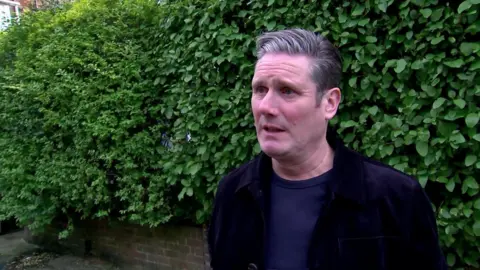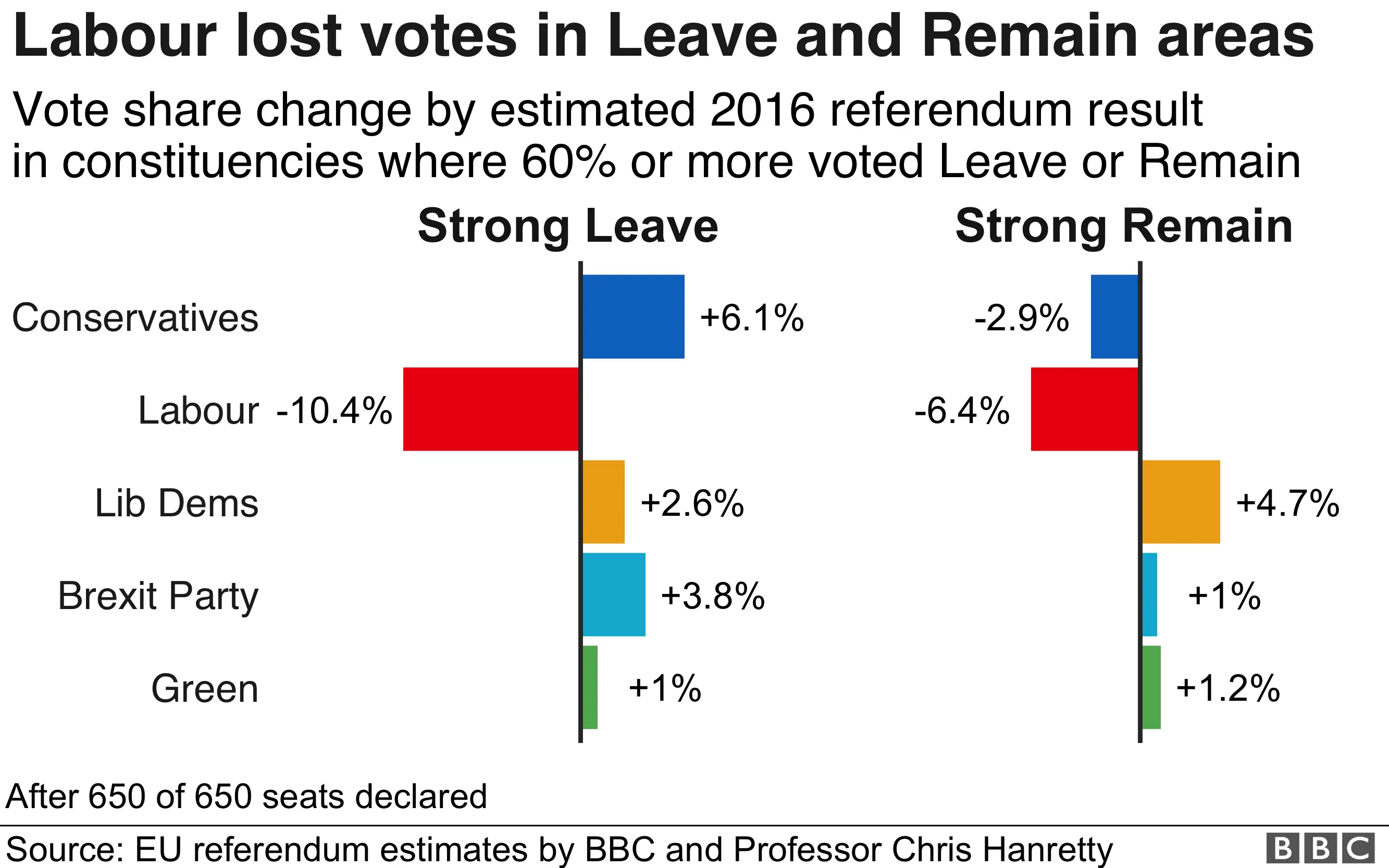Jeremy Corbyn: ‘I did everything I could to lead Labour'
Jeremy Corbyn says he did "everything he could" to get Labour into power and will not "walk away" until another leader is elected.
The Labour leader said the election, which saw the Conservatives sweep aside his party in its traditional heartlands, was "taken over by Brexit".
Mr Corbyn said he was "obviously very sad" but also had "pride" in the manifesto his party put forward.
Some people within Labour have blamed Mr Corbyn's leadership for the defeat.
Former Labour MP John Mann said the leader's unpopularity on the doorstep was palpable and Mr Corbyn should have "gone already" after presiding over his party's worst election performance since the 1930s.
Lord Blunkett, a former Labour cabinet minister, called for the party leadership to apologise for the defeat, adding that they were "lacking in any contrite belief that they made a mistake".
At 33%, Labour's share of the vote was down around eight points on the 2017 general election and is lower than that achieved by Neil Kinnock in 1992.
Mr Corbyn said it was up to the National Executive, the ruling body of the party, to decide when he would go, adding it was likely a new leader would be selected in the early part of next year.
He said he would not step down as leader yet because the "responsible thing to do is not to walk away from the whole thing".
Asked whether he was part of the problem, he said: "I've done everything I could to lead this party… and since I became leader the membership has more than doubled and the party has developed a very serious, radical yes, but serious and fully-costed manifesto".

Keir Starmer, one of the favourites to replace Mr Corbyn as leader, said there was "no hiding" from the election result which was "devastating for our party".
He said it was the party's duty to "rebuild" which was going to be "a very big task".
Asked if he wanted to be the next leader, he said: "I think this is the time for reflecting and understanding the result. I don't underestimate the size of the task ahead."
Unite union boss Len McCluskey, an influential Labour ally, said the result was "deeply, deeply disappointing" and the party had "failed" because it had tried "to go beyond Brexit".
In an article for the Huffington Post, he blamed Labour's poor election performance on Jeremy Corbyn's "failure to apologise for anti-Semitism" and an "incontinent rush of policies which appeared to offer everything to everyone immediately".
He did praise Mr Corbyn's "right and honourable" decision to adopt a neutral stance in a future Brexit referendum, but said the strategy was "fatally undermined from the outset by leading members of the shadow cabinet rushing to the TV cameras to pledge that they would support Remain".
Labour MP Stephen Kinnock, meanwhile, was adamant it was "not a Tory victory" but "a damning indictment of Labour's failure".
Speaking on BBC's Question Time, he said the party's loosening ties to its working class heartlands had been "turbo charged by Brexit".
Shadow cabinet member Barry Gardiner said his party needed to reflect on "what was wrong in the offer that we put forward to the country and what it was people did not feel confident about in our manifesto".
He told BBC Radio 4's Any Questions that Labour needed to move fast to regain the trust of the country.

- WHO WON IN MY CONSTITUENCY? Check your result
- NATIONAL PICTURE: The result in full
- ALL YOU NEED TO KNOW: The night's key points
- MAPS AND CHARTS: The election in graphics
- BREXIT: What happens now?
- IN PICTURES: Binface, a baby and Boris Johnson

The Conservatives took Labour strongholds across northern England, the Midlands and Wales in areas which backed Brexit in the 2016 referendum.
Some traditional Labour constituencies, such as Darlington, Sedgefield and Workington, in the north of England, have a Conservative MP for the first time in decades - or in the case of Bishop Auckland and Blyth Valley - for the first time since the seat was created.
Mr Corbyn was re-elected with a reduced majority of 26,188 as the MP for Islington North.


A brutal leadership battle is almost inevitable.
The likely candidates are keeping their powder dry, but skirmishes have begun over the reasons for Labour's lowest tally of seats since the 1930s.
Those close to Jeremy Corbyn blamed Brexit, media hostility… even the weather.
The party chairman Ian Lavery singled out the party's commitment to a second referendum.
And Laura Parker from the left-wing grassroots group, Momentum, insisted Jeremy Corbyn was the victim of unfortunate political timing.

Reflecting on his party's defeat, My Corbyn said: "My whole strategy was to reach out beyond the Brexit divide to try and bring people together because ultimately the country has to come together."
The party promised to renegotiate Prime Minister Boris Johnson's Brexit deal, and put it to a referendum vote alongside the option of remaining in the EU.
Asked what went wrong for the party, he said: "Those in Leave areas, in some numbers, voted for Brexit or Conservative candidates which meant that we lost a number of seats and we didn't make the gains that I'd hoped we could have done".

Asked whether "Corbynism" is now dead, he said: "There is no such thing as Corbyninsm… there is socialism."
He added: "I don't think [socialist ideas] are unelectable."
Mr Corbyn said his party's policies were individually "very popular" and there was no "huge debate" about them within the party.
Dame Margaret Hodge, MP for Barking, said under Mr Corbyn's leadership, Labour had become the "nasty party", with anti-Semitism allowed to flourish.
Speaking about his party's handling of the issue, the Labour leader said: "I inherited a system that didn't work in the Labour party on anti-Semitism, I introduced the rule changes necessary to deal with it and they're in operation.
"Anti-Semitism is an absolute evil curse within our society and I will always condemn it and also do and always will".
Meanwhile, the rapper Stormzy, who backed Labour ahead of the election and described Mr Corbyn as "a man of hope", has told BBC Radio 1Xtra that the result feels like "a dark cloud".
